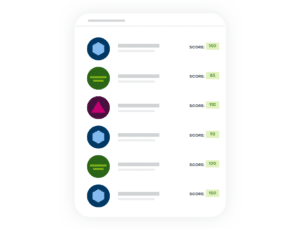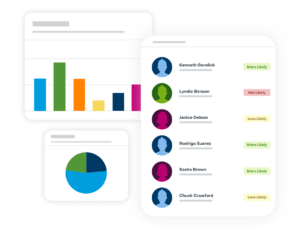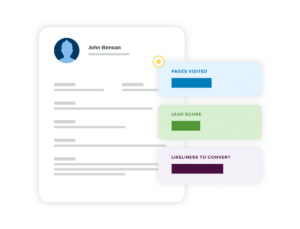5 Benefits of Lead Management Software for Your Business
According to Gartner, lead generation is a top growth priority for many businesses. And yet, in one survey, almost 60% of business decision-makers pointed to lead generation as a top challenge. With so much effort to get those leads, you certainly don’t want to let any drop through the cracks.
That’s where strong lead management comes in. Find out more about lead management and how to do it below.
What Is Lead Management?
Lead management is an umbrella term that describes the entire process of identifying prospective customers interested in your services, tracking and following up with those potentials, and nurturing them to increase the chance they make a purchase.
Understanding the Lead to Customer Life Cycle
Before delving into the overall lead management process, it’s important to understand the typical cycle of a customer from lead to purchase:
- Consumers become prospects when they’re part of your target market. For example, imagine a company that sells technology for high school and college-age students. Prospects would include parents with students who are that age and the students themselves.
- Prospects don’t become leads until they have identified themselves as interested in your products. A person who walks into a retail store becomes a lead by entering the door. Someone who signs up for a webinar to find out more about project management is a lead for a project management software vendor.
- Once the lead makes a purchase, they become a new customer or client. Many people think the process stops here, but for most companies, it doesn’t.
- The new customer can become a repeat customer and then a loyal customer. But that often takes continued nurturing on your part.
What Does Lead Management Do?
Lead management starts with processes designed to generate leads and continues nurturing them. At some point, lead management becomes customer relationship management—when the sales team hands over a lead that’s been converted into a customer and customer service teams continue to nurture those relationships to support repeat business and loyalty.
Here’s a high-level overview of what a common lead management process looks like.
1. Generate Leads
Marketing efforts generate leads. For example, blog posts that help you show up in the search engine results drive traffic to your site. If those visitors enter an email address to sign up for a newsletter or download a whitepaper, they become leads.
Even visitors to your site who don’t hand over contact details can be leads of sorts. Your digital ad network or other marketing tools may capture information about the visitor. That helps advertising networks show your ads to that person as they travel across the internet. It’s a lead of sorts.
Here are some common lead generation techniques to consider:
- Free downloads. Trade a checklist, ebook, or another free download for someone’s email address or phone number and the permission to contact them about your services.
- Webinars. Offer free webinars on topics of interest to your audience. You make the same trade—content for contact information. Webinars can be live, which lets you engage directly with leads, or prerecorded, which lets you turn one live webinar into an ongoing lead generator. Email newsletters. Get people to sign up for your list, and you can nurture them with a weekly or monthly newsletter.
- Events. Generate leads in person by sponsoring a booth at local or industry events. Have a sign-up form to capture leads and drum up interest in your services as you talk to people.
- Social media. Post content designed to get people interested in your services and let them know they can DM for more information.
2. Capture Contacts
Once generated, you must capture the lead. The emails people enter into your site need to go into a sales database or software. If someone DMs your brand on Facebook, you need a way to capture that information.
Leads that aren’t captured can’t be followed up with and nurtured.
3. Score Leads
Not all leads are created equal. Some may not be valid at all, while others are extremely valuable. Lead management should involve a way to score leads to prioritize them within your sales process.
For example, consider the scenario below:
- You create a case study demonstrating the success of your product and offer it as a free download in exchange for an email address.
- Someone who appears to have come to your site only once downloads the case study. They never return and never make contact with your company.
- Another person who appears to have come to your site several times and follows you on social media downloads the case study.
Which of these two leads seems more valuable? It’s probably the second one. While the first might still result in a sale eventually, it may also be someone who downloaded the case study for a purpose that has nothing to do with interest in your services.
4. Nurture Potential Customers
Based on lead scoring, valid leads are nurtured via email drip campaigns, follow-up phone call offers, or invitations to find out more. When categorized with proper lead management, you can create processes that treat leads differently. For example, you may offer a webinar to those leads qualified as potentially seeking more education, while leads that seem ready to purchase might warrant a sales call.
The Benefits of Effective Lead Management
Effective lead management is as important as strong sales materials and lead-generating tools. Check out some benefits of investing in lead management below.
1. Ensures You Capture All Leads
Businesses can’t afford to ignore potential lead sources in today’s competitive markets. And you certainly don’t want to lose out on potential customers simply because you don’t have a way to capture that particular type of lead.
Strong lead management helps you capture as many leads as possible. That includes:
- In-person sign-ups at events
- In-person leads generated in physical stores or offices
- Website sign-ups that involve exchanging email addresses and/or phone numbers for free downloads or other content
- Website leads generated by contact us forms
- Leads generated via chatbots on or off your site
- App-related leads
- Social media leads, such as DMs from potential customers on Facebook or Instagram
2. Determines Which Leads Are Ready for a Sales Process
Lead management’s filtering and scoring process help ensure the leads that go to in-house or field sales processes are qualified. This typically means there’s a reason to believe the lead is primed to become a customer or client, possibly soon.
If a lead is solid, you may want a sales rep to handle it quickly—striking while the iron is hot.
But if the lead is still weak or you have reason to believe the person is still in the discovery stage of the buyer’s journey, direct sales contact could feel pushy or like an intrusion. Pushing these leads to sales clogs up the sales process and can mean your department misses out on connecting with a stronger lead that ends up with the competition.
3. Holds and Nurtures Leads Not Ready for Sales
You don’t want to dump potential leads simply because they’re weak at the moment. Someone in the early stages of the buying process may progress to later stages and become a strong lead in the future.
Lead management helps you hold on to and track those leads, gently nurturing them along the whole time. That’s important because if you are there for the lead in an appropriate manner throughout the buyer’s journey, that increases your chance of being a top choice when they’re ready to buy.
4. Helps Ensure Higher-Quality Leads
All that lead filtering and scoring help ensure higher-quality leads throughout your sales processes. No more throwing additional marketing and sales spend at leads that are unlikely to convert, even in the future.
Quality leads also increase the morale of your sales teams. They’re not spending time with leads that shouldn’t have made it through the pipeline, which means their efforts are more likely to close deals. This is good for your company and your team’s sales bonuses and other perks.
5. Provides Data to Help You Optimize Future Marketing Processes
An oft-overlooked benefit of lead management is that it captures a lot of data. You can use that data to make business decisions that improve your marketing and sales processes.
For example, you might notice that the strongest and most qualified leads come from a certain channel. You could divert some of your resources to invest more in that channel. Or you might discover that leads of all types are more likely to convert when handled by a specific salesperson or team. You can create tips or training materials to level up other sales staff by figuring out what’s different about that team or sales pro.
The Role of Lead Management Software
Suppose you’re wondering how you can gather all this data, conduct the appropriate analyses and route leads to the correct workflows for appropriate levels of nurturing. In that case, the answer is lead management software.
The key to successful lead management in any organization is marketing automation. Technical tools capture leads 24 hours a day and cut down on errors that cause a lead loss in manual processes.
AI-driven by data can also filter, score and categorize leads based on preset preferences and even route those leads to the right workflows. Maybe leads aren’t ready for direct sales interaction. In that case, AI can choose an email drip campaign that matches the lead’s demographics, behaviors, and potential preferences, starting the nurturing process without the need for sales intervention.
Good lead management software also offers other benefits, potentially including:
- Analytics and reporting. Discover more about the demographics of your audience, where your leads are coming from, and what leads do once they arrive on your pages. Do leads linger on certain content, and does your site hierarchy work in funneling visitors through to sales pages? Strong lead management software may be able to help you get answers.
- Create landing pages and other marketing content. Whether a lead management software provides proven templates, helps you understand the needs of interested consumers, or integrates with your content management system, it can help you create marketing content with stronger conversion potential.
- Integrate with sales and CRM systems. Cut down on information silos and drop leads by integrating a solid lead management solution with your other technology. Seamlessly hand-off leads to sales organizations or convert lead contacts into customer profiles in your CRM.
How Sugar Market Can Help
Whether you’re letting leads fall through the cracks or you’re drowning in prospects with no way to capture them properly, Sugar Market can help. Our technology empowers you to:
- Create and implement successful marketing campaigns and drive increased ROI
- Make data-backed decisions about your marketing and sales processes
- Capture, qualify, and route leads, saving time and money while enhancing conversion rates
- Integrate all of your channels, so no lead is left behind
- Launch creative, branded campaigns to drive more leads
- Use AI and technology to support effective lead nurturing
If you want to find out more about how we help businesses accelerate revenue with marketing automation, contact us today. You can also request a demo of Sugar Market online to see for yourself.





